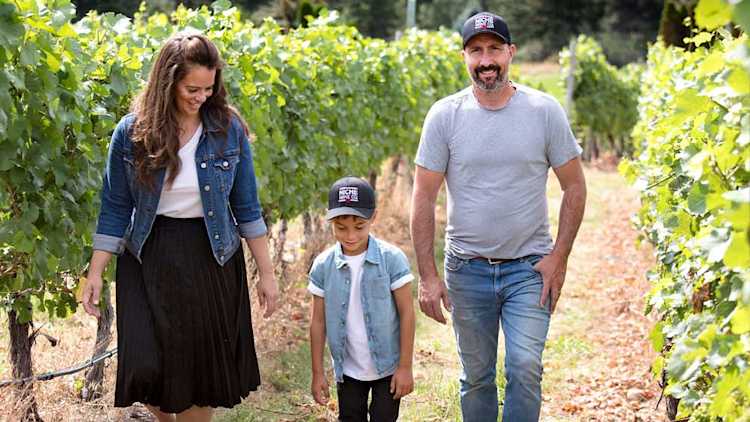Lessons from crisis

In August 2023, fire obliterated over 200 structures, mostly homes, within kilometres of Niche Wine Co. in West Kelowna, B.C. Charred trees, burnt deer fencing and the remnants of an equipment shed are vivid reminders of fire’s force.
Thankfully, the Schlossers’ vines and winery, 10 years in the making, still stand – but their experience is a lesson in risk management and resilience.
Crisis can happen fast
James: My parents started grapes in the nineties. Their 10 acres are below the winery and we have almost nine around the winery building. Years ago, we got evacuated during another fire, but this fire was different.
Joanna: James called from the winery Wednesday afternoon saying, “A helicopter with a water bucket is flying over every 20 minutes. This fire is really close.”
Luckily, an evacuation alert gave us time to think and we decided not to move equipment or inventory. Logistics seemed impossible and we knew it was insured if it stayed. By 5 p.m. Thursday, we were ordered to evacuate. We took a photo and had a glass of wine before we left, toasting what we’d built, feeling the real possibility we wouldn’t see it again. We retreated to our home in Kelowna. We were evacuated from home for 10 days and from the farm for 15 days.
James: The footage we saw later showed a literal ring of fire around the vineyard.
Design your insurance plan thoughtfully
Without [business interruption insurance], we wouldn't have made it through this.
James: For years, I renewed our insurance on autopilot. But we’d changed brokers. They designed a strong policy with business interruption insurance. Without it, we wouldn’t have made it through this. Two and a half months is too long to be shut down, and getting running again takes longer than one might think. During what would typically be big months for our business, we were focused on smoke remediation.
Joanna: We lost our deer fencing. That was insured. Without it, our four-legged friends had no forest food so deer and bear ate most of our 2023 grape crop.
James: We’ve only harvested a small crop from my parents’ vines. Worse, the fire followed two years of unprecedented winter cold. We don’t have much white wine for spring release from last year, but the big impact will be next year. This year we saw cash flow interrupted but next year will be a challenge.
Design a business strategy to include recovery
James: Although we’ve had a loss this year, we have the potential for a full crop next year. If cold or fire meant replanting, we wouldn’t have had grapes for three to five years.
Joanna: Our business strategy has included slow and steady growth, making 500 cases of wine, then 800, then 1,200, being careful not to jump so fast we aren’t able to sell everything or absorb costs. We’re growing sustainably because we have an intergenerational plan, trying to think ahead seven generations from now. This is more in line with my Indigenous heritage, honouring a world view that respects those who’ve gone before us and who will come after us – well beyond a couple of generations
Know your risks
James: When my parents subdivided this property, they were required to do fire remediation, undercutting tree limbs so the fire had less low fuel.
Joanna: We think the cleared land between our deer fence and the vineyard acted as a firebreak. Had our winery/production building been at the edge, we might not have been so lucky.
Fire is part of our ponderosa pine ecosystem. We need to learn to live within it and manage it.
We believe in controlled burns. The Westbank First Nation has been doing a good job. Like our Fire Chief said at the UN, dollars are wiser spent before fires than after. It’s about prevention rather than reaction.
Diversify for future risk-mitigation
Joanna: Based on the weather we’ve faced, this fire cemented plans we’d already considered like diversifying to add revenue streams – things like building small units so people can have an immersive vineyard experience.
James: And micro sprinklers and between-row planting, crops like mustard and clover, to add nitrogen, but also things like beets, carrots and lettuce to sell, a more circular business concept.
Build a community of support
James: In a crisis, it’s hard to function. But the people we’ve surrounded ourselves with offered support. It’s still overwhelming. Joanna’s off-farm boss lent us a place to live.
My friend loaned us a forklift. Other vineyard owners called offering whatever they could, as did our financer.
Joanna: I’ve always been community-minded, but this experience taught us the power of the community you keep.
The help we need and the help we give, keeping those doors open, feeding those relationships is so important.
Prior relationships with local government, and local support organizations like Economic Development, or the City of West Kelowna, were so helpful in quickly knowing the resources available. Knowing we weren’t alone in this emotional roller coaster was comforting.
Be open to change
James: We’re learning how to manage smoky grapes, talking to other winemakers about what they’ve done. And our wine club members have continued ordering. We just shipped to a club member who lost their house. You think, “This has been so devastating on our business,” but there are people in far worse situations.
Joanna: Because we didn’t invest too fast, we’re not feeling handcuffed. We’re going to figure out what’s next, not necessarily being attached to the outcome we dreamt up 20 years ago.
From an AgriSuccess article as told to Myrna Stark Leader.
